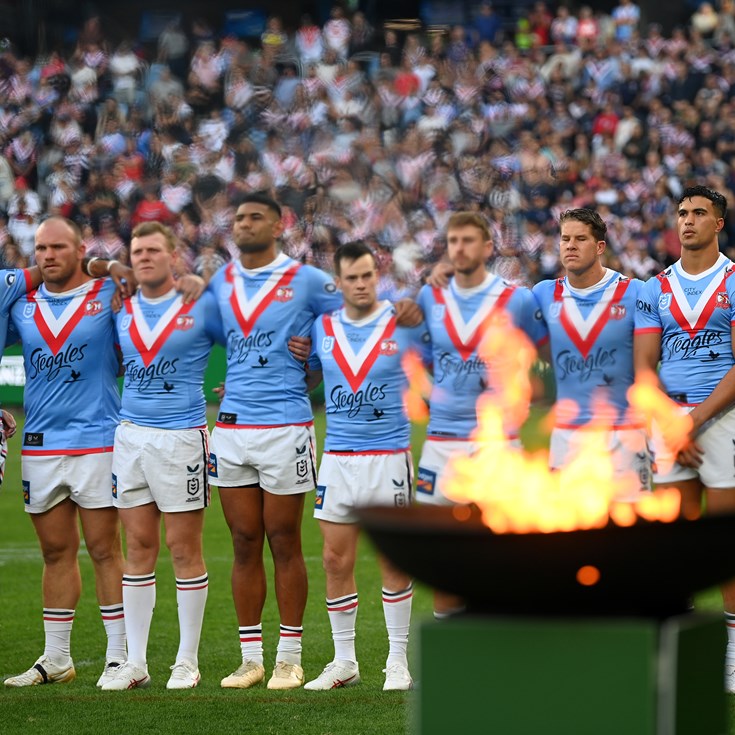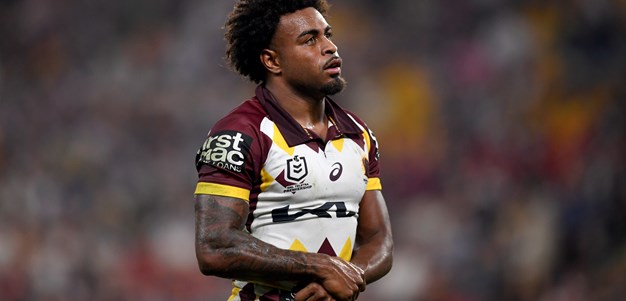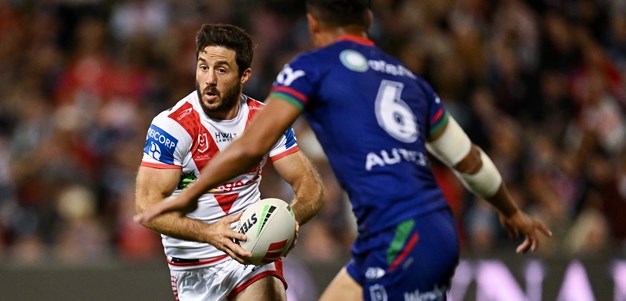Andrew McCullough has spent enough time in the gladiatorial arena of the NRL to retain imore scratches than your Backstreet Boys’ self-titled debut album in 1996 (don’t lie, you all have it).
And yet here he was, in the bowels of Melbourne’s AAMI Park after a disparaging loss to the Storm, sitting with his right ankle elevated and ice heavily bandaged around his right knee, looking every bit the combatant that had just survived a full 10 rounds with the game’s competition heavyweights.
It’s far from the exciting artistic talent dad Graeme has turned out to be in Dalby, a man whose more famous today for his dabble in art than his dilly-dallying in rugby league.
“It’s more of a hobby since he’s getting on a bit now,” McCullough says to Big League.
“But it’s something he wants to do as he gets on. He’s finding it a bit hard to get up the trestles and paint now. But he and Mum have got an art gallery in the Commonwealth Bank in Dalby now so they’ve refurbished that.
“He’s going well out of it and he’s enjoying it. They’re building a house out there now so they’ll finish up there I think.”
But while McCullough may laugh off the proverbial comparison to his old man, there’s clearly something in the family DNA that has emboldened the talented hands of the 22-year-old in 2012; a creative instinct gradually being brought out by Broncos coach Anthony Griffin.
In the wake of Darren Lockyer’s retirement at the end of last season came the arrival of hot-shot five-eighth Corey Norman. But Norman, who has thus far exceeded the tough expectations in filling the boots of a club legend, has done so with the help of his tradesman-like hooker, a man who has played under Griffin since the inaugural Toyota Cup Grand Final of 2008 and has now been entrusted to utilise his attacking wares in the top grade.
McCullough’s six try assists in 2012 are the most by any hooker in the competition and is equal to his total try assists in 76 NRL games in the four years prior. It’s all part of a gradual evolution Griffin has tried to coax out of his young star, a Dalby Devils junior who to this point has forged a reputation as a tackling machine as opposed to a dangerous strike weapon.
“The hooker’s a big part of the modern day game. You touch the ball more than anyone,” McCullough explains.
“You’ve got to create something for your forwards, but obviously if there are opportunities there, you’ve got to take it. That’s what the great hookers in the game do now. I’m slowly working hard on my game to try and be consistent.”
A largely inconsistent 2011 that included a club-imposed one week suspension for an off-field incident in June was followed by a pre-season pow-wow with Griffin that left McCullough questioning his place in the squad.
“I haven’t set any big goals, I just sat down at the start of the year with [Griffin] and thought about where I wanted to be this year,” he says.
“We had a chat and I knew that I needed to perform for the Broncos week in, week out. I’ve probably made smarter choices. Just making the right options and being honest with yourself.
“Hook’s really into me about making sure my preparation’s right and making sure my worst game is not too far from my best game. It’s an important position these days – there’s a responsibility that comes with it.
“And it’s a confidence thing. I’ve worked hard and the boys are certainly helping out. Hook’s given me that opportunity. Kurt [Baptiste] and Ben [Hunt] are knocking at the door so there are plenty of opportunities for blokes to take your position if you’re not performing.”
Says Griffin: “He’s getting more selective with his ball play and his conditioning’s a lot better.
“He got thrown in the deep end [in 2009] but that’s been really good for him. He started at a really young age… 18 playing first grade, he’s probably played 70 or 80 games now.
“[But] there’s always something to work on. He can keep working on his attacking game out of dummy-half and his kicking game. He’s worked very hard but [the try assists] is something we’ve tried to develop a bit more as a group with the halves and hookers. He’s certainly making a bigger contribution in that area.”
Slowly and surely McCullough is becoming an all-round player, instead of the one-dimensional hooker that we’ve seen in the early stages of his career. He may not be the Vincent Van Gogh of rugby league, but there’s no doubting his artistic influences are beginning to come to fruition in 2012.
As for swapping the footy boots for a paintbrush, however, McCullough admits that’s one ability that may have eluded him.
“I think I missed that gene. I certainly can’t draw or paint anything like [Dad] can,” he says.




